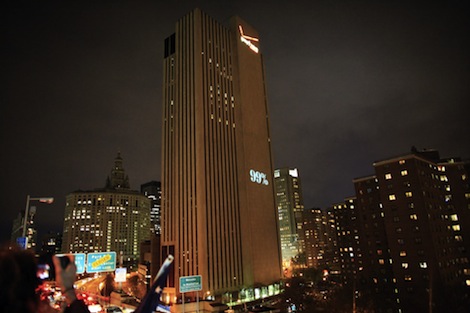
Even if it were to disappear tomorrow, Occupy Wall Street would have already scored a massive victory. It has fundamentally altered one of the dominant narratives that underlies the majority political and economic thought in this country: that as much as Americans might be dissatisfied with politicians, they have no real complaint with inequality, or the economic system that makes it possible and perpetuates it – namely capitalism. Occupy Wall Street ruptured this narrative through the occupations and massive popular support. Before September the sentence, “Americans are dissatisfied with social inequality” would have been debatable to say the least, pertaining only to a small faction of leftists and academics. Now it can be stated as fact, a fact that the existing forces and powers do not know what to say about.
One does not rupture a dominant narrative without being reincorporated somehow. The two-month history of Occupy Wall Street has been a struggle on the part of the managers of public opinion, the pundits, newscasters, and comedians, to make sense of this event, to place it in another narrative. First, there was the discussion of demands, or the lack thereof; “What are their demands?” became the dominant question. This was followed with the focus on the conditions of the camps, the stories of rats and public urination. When these failed to catch on, failed to contain growing support for the movement, violence became the issue. Not the violence of pepper spray, rubber bullets, flashbang grenades, and clubs, but the “violence” of broken windows and garbage cans set on fire. According to the time-honored tradition, violence is the preferred narrative to discredit the movement. It is perfect because of its ambiguity; headlines that state, “Violence Mars Protest,” never need to mention who was the subject or object of violence, or concern themselves with the distinction between broken windows and broken skulls.
All of this is a preamble for my observations on November 17, a day of action in New York City. This day was called months ago, as a commemoration of two months of occupation, but it took on added significance after the eviction of Zuccotti Park earlier that week. Now the question was whether the movement could outlast the occupation. This was the question everyone was asking, or at least the reporters, and there seemed to be reporters everywhere. I spoke with four over the course of the day. More than my personal motivation and background, they wanted to know what I thought about the events of the day, what did they mean? The day had not even ended, we had not even learned that the New School was occupied or that over 30,000 people would gather in Foley Square, but it was important to interpret preemptively, in advance of the day’s events.
The interruption of the dominant narrative is an important event. It is a great accomplishment to get pundits and politicians to talk about inequality and exploitation; to see the media discuss what it is usually so dedicated to obscuring – inequality, exploitation, and the pointless suffering of so many. Interrupting the dominant narrative is not the same thing as controlling it, however, and the latter is nearly impossible. The individuals who police protests, defending the windows of Bank of America and Whole Foods against rocks and paint with their fists, are trying to do this, as are those who would cast out every homeless person from occupations all over the country. Such attempts to “control the message,” to appear nonviolent and respectable at all costs, are futile. Windows will get broken, and there is no end to what can be construed as violence, linking arms being the latest. Moreover, they end up reproducing all too quickly the very structures of domination that are being resisted. They are dictatorships without the proletariat.
This does not mean that any event, any interruption, must then become the plaything of the dominant forces. It does mean, however, that one has to extend the interruption as much as possible, create new ways of disturbing the dominant narratives and ideas. I saw two in New York on that day. The first was seemingly small, the Occupy the Subway action, which brought the “people’s mic” and stories about unemployment, debt, and precarious existence onto subway cars, cutting through the filters that separate people from each other. The second was the massive projection onto the Verizon building, a beautiful work of political poetry with the central message, “We are Winning.”
While the two worked in opposite directions, one cutting through the spectacle and the other creating its own spectacle on a massive corporate edifice, they both contributed to a central task, building collectivity, forming in concrete ways, the “We” of the 99%. One created lateral connections, the other created an image of power, of possibility, that is just as important: people act out of solidarity and a sense of their own power. Finally, in this task of interrupting and breaking dominant narratives, a task that is inseparable from creating new ways of making sense and relating, one cannot discount the way in which the loss of the system’s legitimacy works to undermine itself as well. On November 17 I saw police lash out in acts that seemed more like rage than even organized repression, punching people behind barricades and forcibly grabbing people from crowds. Others saw this as well, live or on YouTube, and with this another narrative falls, that of the police as neutral guardian of order.
We are repeatedly asked what this event, this eviction, this general strike, means for the Occupy Movement. Perhaps we should also ask what this movement means for the narratives that legitimate existing power structures.
Jason Read is Associate Professor of Philosophy at the University of Southern Maine. He is the author of The Micro-Politics of Capital: Marx and the Prehistory of the Present and is currently working on a book on the politics and political economy of transindividuality for Historical Materialism.
 Viewpoint Magazine
Viewpoint Magazine